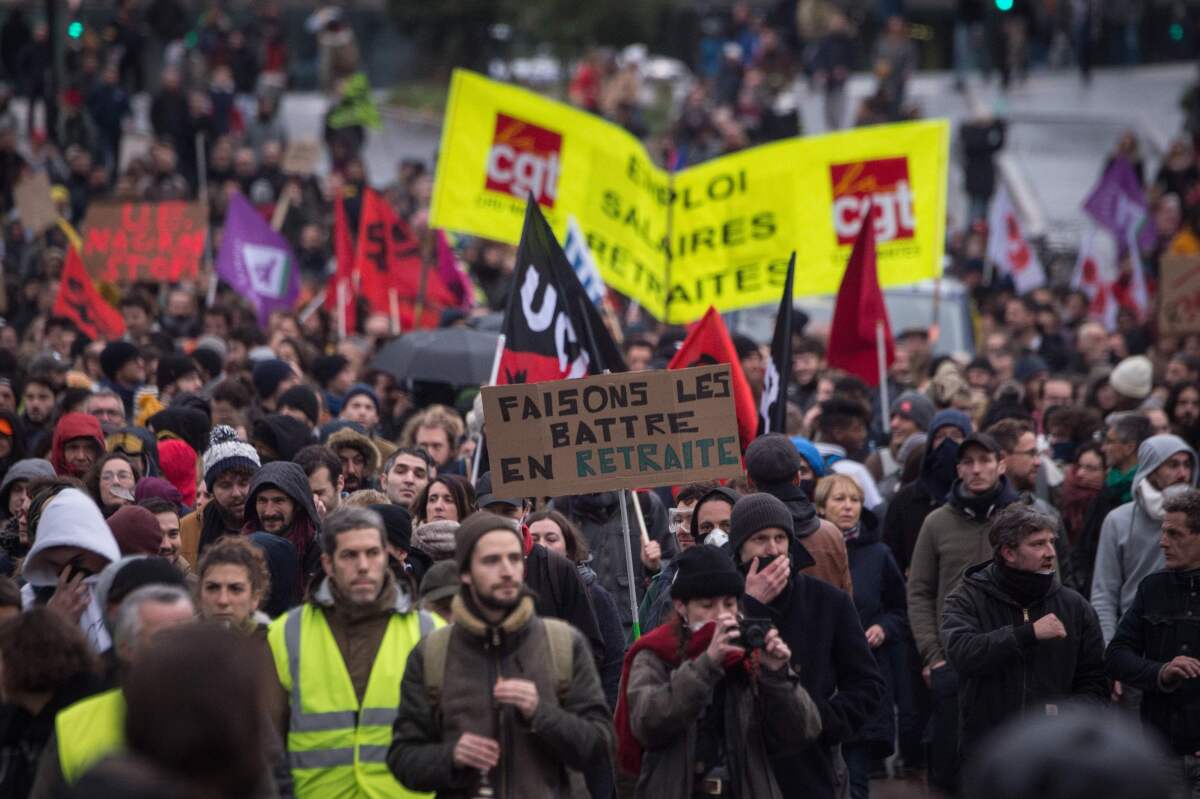Les Misérables: Why are the French, who seem to have much, so quick to protest?

- Share via
PARIS — When the French get angry, the world gets wind of it.
For the last week, bus and train drivers have been on strike, paralyzing the public transportation system. Police officers, teachers, civil servants, hospital staff and many other workers have joined in protests over President Emmanuel Macron’s plans to reform the country’s complex pension system.
Demonstrations in France are nothing new. Every Saturday for more than a year, French people of all ages and from all walks of life from all areas have donned high-visibility yellow vests to demonstrate their general unhappiness.
Even before the “yellow vest” movement, which started in November 2018 as pushback against proposed fuel tax hikes and exploded into the expression of a general sense of injustice, disgruntled farmers would regularly rumble up the highways in tractors to dump perfectly edible vegetables on the steps of the French Parliament, or truckers would launch an “Operation Escargot,” driving at a snail’s pace to block major roads.
Puzzling as it may seem in a country that appears to have so much going for it — fine wines, haute cuisine, high fashion and roughly 1,000 different cheeses — the French are Les Misérables. As author Sylvain Tesson told France Inter radio recently: “France is a paradise inhabited by people who believe they’re in hell.”
Economist Claudia Senik, a professor at the famous Sorbonne University, has studied the French malaise and believes it dates to the 1970s and the end of the “Trente Glorieuses,” the 30 postwar years when France boomed.
“It’s linked to the way the French view the world and their place in it. They have high expectations about the quality of life, freedoms and many values driven by the French Revolution and this sets a high benchmark for satisfaction,” Senik says. “They look back at a golden age when France made the rules of the game, and now we are just another smallish country forced to accept and adapt to rules.”
In her research paper, “The French Unhappiness Puzzle,” Senik found that even when they leave France to live elsewhere in the world, they take their gloominess with them, suggesting it is not France but being French that makes people unhappy.
“I was surprised to discover that since the 1970s the French have been less happy than others in European countries, much less happy than you’d have thought, given their standard of living, lifestyle, life expectancy and wealth,” Senik says. “It’s a problem of culture, not circumstance. It’s the way they feel, their mentality.”
On paper, the French have few reasons to be gloomy: They enjoy free and universal access to an enviable health system ranked first by the World Health Organization, free schools and universities, a maximum 35-hour workweek, six weeks’ annual vacation, paid parental leave and an enviable welfare safety net.
Despite the recent strikes, the pension system is comparatively generous: Retirement age is 62, but many workers in the public sector, including train drivers, can retire much earlier, some in their early 50s. It is not all milk and honey: Unemployment is high, especially among the young, and those in the countryside claim — rightly — that rural regions are being “desertified,” abandoned by medical professionals and companies.
Christian Malard, foreign news director at one of the state TV channels, France 3, has described his compatriots as “whiners” and declared in an interview that “complaining should be a national sport.”
“French melancholia is a puzzling paradox,” says Matthew Fraser, an Anglo-Canadian professor at the American University of Paris. “After three decades in France, I have wondered many times how a nation so spoilt, famous for their joie de vivre, are always so bloody miserable?”
Fraser says understanding this misery means looking into the French soul. “The French are philosophically pessimistic. In Anglo-Protestant culture, we are optimistically turned towards the future, driven by the goals of progress and material gain, emboldened by a conviction that anything is possible,” he says. “French culture, by contrast, is cynical, fatalist and essentially pessimistic. Anglos live in a ‘yes’ culture; the French inhabit a ‘no’ culture.
“Americans consult life coaches with the goal of self-improvement. It’s goal-oriented and based on a positive outlook,” he says.
“The French see a psychiatrist for a lifetime and never feel their deep-seated troubles have been resolved. French melancholy is inscribed in literature and art. Voltaire satirized optimism in his classic ‘Candide.’ Later, French existentialism made nihilism fashionable,” Fraser adds.
Anne-Elisabeth Moutet is French, but seems happy enough, perhaps because she was educated abroad and has spent time in the United States.
“Is this just one article? I think it needs a series,” she jokes.
Moutet, a Paris journalist and political commentator, says the French suffer from “tall poppy syndrome.”
“Life is pretty good here and there are a great deal of things the French take for granted that either people in other countries don’t expect or that cost money,” she says. “The French don’t appreciate that.
“In the U.S. you can face bankruptcy if you are ill and don’t have health insurance, but when you are not sick you’re having fun,” she says. “In France you don’t have to pay for education or health, but if you say you are happy and prosperous someone will come and cut you down to size. Original thought is not encouraged, tall poppies are not encouraged.
“France is not a ‘yes, we can’ civilization, it’s a ‘no, we can’t.’ We have a saying: If you want to live happily in France, live hidden,” Moutet says.
This existential crisis, however, has a serious side. In 2014, a study by the country’s National Drug Safety agency found 32% of French took antidepressants, sleeping pills or other mood-altering medication on a regular or occasional basis.
France’s public health authority suggested 7.2% of French adults had attempted suicide at some point and the WHO puts France 17th on its list of suicide rates by population, 10 places higher than the U.S. and well above Iraq (165th), Somalia (141st) and Afghanistan (137th).
The Well-Being Observatory, which carries out quarterly surveys of 2,000 French households, says its research shows French people are most depressed when they are asked about the future. Fewer than 10% are optimistic about prospects for the next generation, and around the same number do not believe their standard of living or finances will improve.
Senik suggests one root of French melancholy is the country’s rigid education system that she says fosters intense competition to be the best, leaving the rest to feel inferior, creating unrealistic expectations and fostering distrust and envy. “It doesn’t build self-esteem or self-confidence,” she says.
In his new book, “Delicious French Unhappiness,” Denis Olivennes writes that France has become a “society of mutual detestation.”
“The French model, the strong feeling of a common identity culture, is finished. Everyone thinks their neighbor has it better than them and so we all have this intense social resentment, jealousy and mistrust,” he writes.
This French happiness paradox is exemplified by the current unrest: Various polls suggest a majority support the need for pension reform, but a majority also support the strikes.
Senik says striking and protesting may be a French cliche, but it is a way for her compatriots to exert their identity and reject the dull homogenization of globalization.
A colorful example of this is the mustachioed sheep farmer José Bové, who famously took a chainsaw to a McDonald’s restaurant under construction near Millau in southern France in 1999 and became an instant national hero. Bové, and his supporters, saw the fast-food chain as the epitome of junk food, nefarious American influence and the horrors of globalization. At the time, as now, France was one of McDonald’s biggest markets outside the United States.
Philippe André, a cheerful Frenchman living in Paris, laughs at the contradictions.
“If the French were logical … well, they wouldn’t be French,” he says.
Willsher is a special correspondent.
More to Read
Sign up for Essential California
The most important California stories and recommendations in your inbox every morning.
You may occasionally receive promotional content from the Los Angeles Times.










